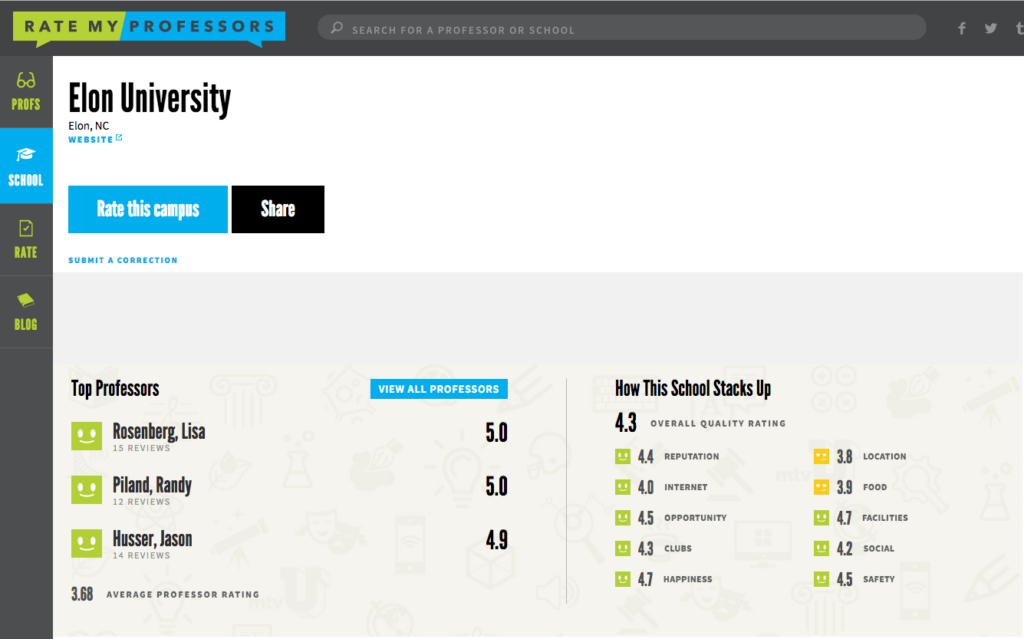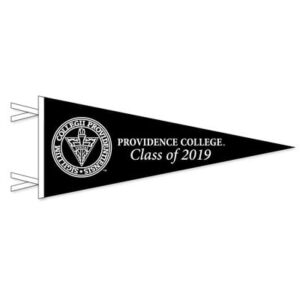Tag: Julia McCoy ’22
Tangents and Tirades
by The Cowl Editor on February 14, 2019
Opinion

E-Tipping: Compensation for Dunkin’ Nation
Dunkin’ holds a special place in the hearts of Providence College students. The New England staple energizes exhausted students with its iced coffee, and employees always serve the much-needed caffeine with a smile.
However, since most students pay with a card, these employees could be missing out on possible tips. A solution to this problem would be the installation of an electronic tip option, as seen at other businesses, in which the customer can opt to tip through their card.
In some businesses, the electronic tipping occurs at the end of a transaction. A pop-up on the screen offers the customer to select a percentage to tip, usually ranging from 10 percent to 20 percent.
Other establishments offer a “round-up option” which gives customers the option to tip change up to the next full dollar. For instance, if a coffee costs $2.45, the remaining 55¢ can be allotted for tipping to reach a full $3 charge on the card. This works similarly to cash tipping, since the majority of tips from cash usually originate from remaining coins.
Since the Dunkin’ employees work hard to provide a valuable service, always with great effort and friendliness, an electronic option for tipping can demonstrate the appreciation for their dedication. In this way, students can thank the employees for making their beloved coffee. After all, PC runs on Dunkin’.
—Elizabeth McGinn ’21
‘Democracy Dies’ Ad Pays Respect to Journalists
Amongst the usual plethora of car and Bud Light commercials seen during this year’s Super Bowl, there was an advertisement that stood out among the rest: the Washington Post’s “Democracy Dies in Darkness” ad.
While Super Bowl commercials are usually funny and lighthearted, the Post took their ad in a different direction this year. They decided to highlight the importance of their work while also paying tribute to journalists who have been taken hostage and killed in the past few years.
The commercial emphasizes that “Knowing empowers us… knowing keeps us free.” It was a rare political message amid the usually light commercial breaks, but it was absolutely necessary.
The phrase itself, “Democracy Dies in Darkness,” is not new for the Post—it appeared on their website in early 2017—but the need for it persists. Another phrase, almost the opposite of the Post’s slogan introduced itself around the same time: “fake news.”
Introduced in the early months of President Trump’s tenure, “fake news” encapsulates the president and his cabinet’s idea that news outlets are not presenting facts and are instead exaggerating their stories as a way to gain support in opposition to the president.
This year’s commercial seems to recognize and respond to these opinions. It highlights the importance of facts and remembers those who were forgotten for what they suffered through in order to deliver those facts.
The ad was a poignant and touching tribute to the work of journalists and the importance of facts in this polarized society.
—Julia McCoy ’22
If DWC Work Leaves Ruane, DWC Books Should Leave the Library
As every freshman and sophomore at Providence College is enrolled in the Development of Western Civilization (DWC) program, the books required by most sections of DWC prove to be a hot commodity in the Phillips Memorial Library.
To that end, the library has implemented a policy limiting the use of their stock of DWC books to a two-hour check-out period within the library.
While this presents as logical, as these books are in high demand, it also proves problematic for students in situations where they may require book usage for a more extended period of time, such as when they are writing an essay or studying for an exam.
Additionally, the library is connected to the Ruane Center for the Humanities, which houses all of the College’s DWC classrooms. If students were allowed to leave the library with checked-out DWC books on occasions when they forget their books for class in their dorm rooms, students would be better prepared for class as they could quickly grab a copy from the library.
Not to mention the frequent circumstances where books for DWC become backordered in the bookstore, and in turn, a student cannot even begin his or her DWC reading until the book arrives, which in many cases consistently proves to come in the mail after their class has already read it.
Needless to say, PC students should not be obligated to resort to book theft to merely complete their DWC homework, as this dilemma can be easily remedied—-the College should invest in more copies of all DWC textbooks and allow students to check them out of the library to use at their convenience.
—Alyssa Cohen ’21
Dress the Part of an Adult: Wearing Nice Clothes for Class Prepares Students for the Workplace
by The Cowl Editor on February 7, 2019
Opinion

Waking up for an early class is tough as it is, but putting in the extra effort to make your outfit look presentable can make all the difference in your day.
Though it seems trivial, wearing nice clothes to class can boost confidence, allow students to feel more successful, and prepare them for the professional lives they are striving towards.
When preparing for a participation-focused class, it is important to feel confident about the things that you plan to say. One anxiety-inducing aspect of a seminar class is the focus on you as you speak; some consider these worries to be less intense when they feel better dressed.
“Dressing up helps me stay focused and increases my confidence in class,” Kristen Moran ’22 said. She continues, “I am always more likely to speak in class when I dress up because of the confidence wearing a nicer outfit gives me.”
It is, of course, not necessary to dress up every day for class. The freedom to choose is entirely up to the individual. Some days are tough and being comfortable has more benefits than dressing up.
What really matters is the feeling that you get when you look in the mirror. If you can feel positive and confident in sweatpants, wear those. Dressing nicely is simply an option to bolster and encourage that positivity.
In terms of feeling successful, dressing up for class can elicit a positive response from peers, making the process worth it. Feeling confident among peers and being encouraged by them engenders a feeling of self-satisfaction that can brighten anyone’s day.
Dressing up on campus is not strictly bound to classroom courtesy; practice interviews that take place in Slavin 108 are much more successful when you dress for the part.
If you arrive at a practice interview in the appropriate attire, you will become immersed into a more realistic simulation of what an interview will actually include. Rehearsing in the correct clothing will certainly make you feel more comfortable when you are in the actual interview.
This point brings up an aspect of psychology known as context-dependent memory. If you submit yourself to the most realistic atmosphere of an impending stress-inducing event, you are more likely to feel comfortable and adapted to that atmosphere when the time comes.
Similarly, it is important to remember where we are and what we are ultimately working towards. Nearly half of the students at Providence College are members of the business school or will enter the business world post-graduation; these students are likely to continue this path into a professional business career in their post-graduate life.
In order to prepare themselves for the lives they are working towards, dressing in business attire is a requirement for certain presentations and events.
The Career Expo and in-class presentations are two examples of times in which students dress as nicely as possible. These situations allow them to understand what is appropriate for their future line of work and get them acclimated to the type of clothing they will be wearing through the duration of their professional lives.
These events are obviously out of the ordinary and therefore require special attention. However, a muted yet still professional look is certain to keep up this feeling of professionalism on any given day.
Essentially, dressing nicely, but not always too professionally, is a way to slowly ascend to the soon-to-be daily wardrobe of most working professionals.
Though it may seem trivial to think about now, college does not last forever and we are eventually going to be thrust into the professional world. Gaining confidence and professionalism in a risk-free environment will help students ascertain the skills they need to become successful in the workplace.
“Are You Still Watching?” : Netflix Subscription is Worth it Despite Price Increase
by The Cowl Editor on January 24, 2019
Opinion

watching.
“Are you still watching?” is a phrase you may be familiar with if you, like many others, binge watch Netflix in your free time. But in 2019, it may have an entirely new meaning.
In terms of post-class entertainment, Netflix is the most frequently used by Providence College students. However, the upcoming price increase could have an effect on business.
While the price hike may seem extreme— Netflix is upping the prices of its standard plan by two dollars—the benefits of owning the streaming service definitely outweigh the costs.
In the past year alone, Netflix has released over 100 original films. They range from critically acclaimed films such as Roma, to the summer sensation To All the Boys I’ve Loved Before. Not to mention their successful branch of comedy specials, such as John Mulaney’s Emmy-winning Kid Gorgeous at Radio City.
In addition to their plethora of films, Netflix has had continued success in television as well; Stranger Things is slated to have a popular third season coming up and Queer Eye has become a cult classic in the last year.
Their proliferation of award-winning original content is certainly one cause of the price increase. However, the entertainment and success that these films and series bring to the streaming service are certainly worth a price increase.
While their own series have had immense success, the shows and movies that Netflix has acquired the rights of are also enough to draw in the continuing crowds. It is, in fact, how they started their streaming service years ago and what immediately attracted audiences.
One of the most noteworthy, and fairly controversial, Netflix acquisitions in the last few months was the saving of Friends. Netflix will pay upwards of $100 million to keep the popular ‘90s sitcom on the service for at least one more year.
Though this hefty cost may seem a bit extreme for the 25-year-old program, it was at the request of a significant number of Netflix subscribers. This is likely to be one of the reasons why Netflix has to update their subscription prices.
Compared to its competitors, Netflix’s subscription price is not entirely unreasonable. Hulu offers a basic plan at $7.99 per month that only offers one screen per account, and a $14.99 per month subscription that offers unlimited screens.
The news coming from the streaming service does, however, come with its downsides. Many accounts are reporting that the popular service will be able to detect and stop account sharing.
If friends and relatives are no longer allowed to share passwords with a Netflix-owning peer, they could be entirely dissatisfied with the service’s actions and therefore, stop watching altogether.
Thus far, this is the only part of the new plan that should drastically affect the success of the service. Despite this change, it is still well worth streaming Netflix, even with the price increase.
Tangents and Tirades
by The Cowl Editor on January 17, 2019
Opinion

Bring Cash Back to Slavin Ticket Office
This past Wednesday, Providence College students received an email regarding a new policy for purchasing tickets at the Slavin Ticket Office.
Starting this semester, students will only be able to purchase tickets with PC Cash. Previously, students had the option to purchase tickets with regular cash.
It is unclear why this change has been made but it is safe to say that students who do not frequently use PC Cash will be annoyed with the new policy.
This new method of payment will be a nuisance to many students who wish to buy event tickets but may not use PC Cash frequently enough to justify depositing money onto their PC ID.
For students who do not have money loaded onto their PC ID, the hassle of depositing cash to their card may lead to students putting off purchasing tickets or even dissuading them from doing so completely.
Although this new policy will most likely be more convenient for those working at the ticket office, it will be a hassle for the rest of the students and faculty who want to purchase tickets through PC.
As a college student, convenience is one of the major factors when considering where and when to make purchases. The opinions of students should be taken into consideration when making decisions that have to do with student life on campus.
While this is admittedly a trivial thing to complain about, this policy change emphasizes the importance of taking student life into consideration when making this type of change.
—Bridget Blain ’19
Change Red Carpet Questions for Women
In the midst of the second awards season following the initiation of the Times Up movement, there is an eye on the red carpet. Though choosing to sport more colorful dresses instead of a monochromatic movement at this year’s Golden Globes, women in Hollywood are still making strides towards equality.
Since the origination of televised red carpets, women have consistently been asked the same question: “Who are you wearing?”
For years it seemed that this was the only question in an interviewer’s repertoire. However, in more recent years, women in Hollywood have initiated change in this particular field.
Before Times Up and other wide reaching organizations emerged, smaller groups were urging change in simpler ways.
Amy Poehler, for example, started a group called Smart Girls, which offered more intellectually stimulating questions to celebrities on the red carpet. Though it did not completely change the atmosphere on the carpet, it certainly got the ball rolling for change.
As women continue to be snubbed in certain categories at awards shows such as Best Director, it is important that they keep their voices heard as a way to spark a reaction in viewers and influential people in Hollywood; one way to do this is through what is said on the carpet.
The only way to initiate these conversations is through the facilitation of a red carpet interview host.
When asking questions, the hosts tend to stick to a more superficial level of questioning: who are you wearing? Why did you change your hair color? Changing this will be the first step towards a better carpet environment—and equality.
—Julia McCoy ’22
Remember Self-Care in Times of Stress
Self-care: a term many people associate with indulging in ice cream, putting on a relaxing face mask, or watching one’s favorite movie. All the aforementioned can be considered self-care, but many people, especially college students, seem to forget that self-care is much more than that.
Self-care is a critical part of our overall happiness during college. With everyone coming back to school after spending quality time with family and friends, it can be very easy to feel overwhelmed when coming back to a full workload of classes.
That is when one should focus on self-care and realize that one’s mental and physical health should be first on one’s priority list.
Focus on what is truly important, enjoy every single moment, and realize that life is priceless. If you are feeling buried in coursework, talk to your teachers. If you miss your family, call them. If you are suddenly more focused on writing your essay than caring for yourself, set your priorities straight.
So, nurture your soul, talk about your feelings, keep a journal, eat food that fuels you, go to bed early, and do not stress, because at the end of the day getting straight A’s will not matter if you are not truly happy and able to enjoy life.
—Angela Bueso ’22
Stop Overusing “Sorry”: Frequent Apologies Devalue Meaning of the Word
by The Cowl Editor on December 6, 2018
Opinion

by Julia McCoy ’22
Opinion Staff
It’s quite common, whether on campus or off, to say sorry more than once a day. But how many times are we actually apologetic rather than just not wanting to cause a minor inconvenience?
“Sorry” is a word frequently used by females. It is commonly used as a way to avoid confrontation.
However, an issue arises when women begin to use this word excessively. Women begin to say sorry as if everything is their fault. It seems like it is their obligation to take the blame for even the slightest inconvenience in someone’s life.
In the course of a day, many situations present themselves in which someone is slightly inconvenienced. For example, if an elevator door is closing and someone gets on last second, causing a slight delay, the person entering the elevator is very likely to say sorry.
Are we genuinely apologetic for getting on the elevator, something anyone would do in our position? No.
What actually occurs is much more a result of social pressures. Women are socialized to be more passive and apologize in advance in order to avoid any sort of confrontation. As a result, an overcompensation of passivity engenders an excessive amount of apologies.
Abigail Pruchnicki ’22 said, “When I say sorry, I usually feel like I’m not actually sorry. I feel like I have to say it so someone will not judge me.”
Like many others, Pruchnicki addresses an issue of social pressure. Instead of addressing an actual issue and understanding the reasons for which she should be excused, many girls feel they need to apologize for things that have not yet been presented as issues.
When asked about why she apologizes, Kristen Moran ’22 said, “It is not always genuine, I just don’t want people to be mad at me. I feel as if I have to say it so people don’t judge me.”
In a constant state of worry regarding what people think, girls are hyper aware of their actions.
According to an article from Greater Good Magazine, writer Emma Seppala said, “Women do, in general, report experiencing more compassion in their lives than men report doing,” having been socialized differently from infancy.
This is likely a result of the different ways in which men and women were raised. From childhood, girls are told to act “like a lady.” They are taught to be conservative in stating their opinions and in causing any sort of mild discomfort for the people around them.
“I have to say sorry for doing things that are not ladylike or out of character for myself,” said Pruchnicki.
To maintain an image that is pleasing to an outside perspective, women must apologize for things that might not be pleasing to those around them. Women find it necessary to apologize for asking too many questions, which will only benefit them in the end.
Consider this next time you go to apologize to someone: are you genuinely sorry? do you feel the need to be excused for something you did?
If the answer is no, consider another phrase. Perhaps “thank you” when someone holds a door a second too long or waits on the elevator for you. “Excuse me” is a great alternative when you almost bump into someone.
In short, “sorry” is a loaded word that carries much more significance when it is not heard various times a day. Consider the weight of your words and they will become more meaningful than ever before.
Students Must Look Beyond “Rate My Professors”
by The Cowl Editor on November 15, 2018
Uncategorized

by Julia McCoy ’22
Opinion Staff
Registration is arguably one of the most stressful times of the school year. However, the most stressful aspect of it is likely the anxiety that comes with not knowing your professors’ level of difficulty.
A popular way to quell this anxiety is to use ratemyprofessors.com, a website that allows former students to evaluate their professors in areas such as level of difficulty, grading toughness, and overall quality. While this website is frequently accessed by students at Providence College, it is not a trustworthy choice.
A result of the Rate My Professors craze is competition that arises among students when they try to register in the “easier” classes. This competition adds even more stress to this chaotic time of year.
The amount of effort you put into a class determines your result. The professor is not the only factor that determines your grade or how well you do in the class.
What is important to remember is that every student has their own opinion about a professor. Everyone prefers a different teaching style, and opinions on which style is better cannot be accurately conveyed through a website such as Rate My Professors.
In terms of reliability, Rate My Professors allows students to voice their honest opinions. It does not, however, seek to provide further information on the student’s background or learning preferences.
The anonymous reviews on Rate My Professors give absolutely no indication of the student’s major or any other information. This information is essential because it would allow students to see similarities between themselves and the person who is reviewing.
Regardless, Rate My Professors is still a popular website among college students trying to find the best fit for next semester’s schedule. If they succeed in enrolling in the “best” class, they are likely less burdened by the anticipation of next semester.
In an ideal world, Rate My Professors would certainly be a helpful tool for students. It should not, however, include such heavily biased opinions and ineloquent judgments of a professor’s character.
On the other hand, failing to enroll in your preferred class can leave you worrying for two months before the next semester begins. Reading negative professor reviews not only scares students, but creates a predetermined bias against a professor that is quite difficult to shake.
A bias against a professor that you have never experienced in the classroom is unnecessary and does not reflect your own opinion.
Rate My Professors hinders students from being open-minded. However, being flexible is essential to getting through any class, regardless of the professor.
It does not make sense to rely so heavily on other people’s opinions, and one review should not prevent you from taking a class that you are interested in.
When choosing which classes to take next semester, focus less on other students’ opinions of the professor and more on the course description. If it’s beneficial to your major, filling a core requirement, or it peaks your interest, that is all that matters.
Tangents and Tirades
by The Cowl Editor on November 8, 2018
Opinion

Sharing is Caring: Sidewalk Etiquette
Sidewalks on campus are the highways of Providence College. Every day, students use them to get to and from their classes and appointments. And like any off-campus highway, the PC sidewalks are frequently congested with easily-avoidable traffic.
While sidewalks on campus can certainly function as social spaces, their prime purpose is to allow for swift travel between various places. When individuals walk two or even three across, it blocks traffic, and in some cases, prevents a student from making it to their class on time.
Inadvertent swerving is another prevalent walking behavior on sidewalks and in the dining halls, which inhibits others from getting to their destination. Taking the time to focus on one’s surroundings is the simplest fix for this.
Sure, it can be easy to get distracted and caught up in the humorous anecdote your friend just shared, but in the few seconds that were spent slowing down and stopping from intense laughter, several people had to walk around you. You became an obstacle in another person’s travel path.
It is important to remember that we are each one of 4,874 students sharing the Providence College campus. Each of those students occupies space and needs to be taken into account when traveling around the grounds of PC.
“Share the road” has become a popular slogan for driving safely across the nation. Adopting this policy when walking around campus will create a more considerate, traffic-free community at PC.
—Joshua Chlebowski ’21
Sports Culture at PC
The words of “Sweet Caroline” are much more bittersweet on this campus than they have been my entire life.
Growing up in Massachusetts, sports-loving culture is something you are born with; it comes naturally. The amount of pride we have for our sports teams is absolutely unreal.
Coming to Providence College and realizing that not everyone worships Tom Brady or loves the Red Sox was an adjustment I’m still getting used to.
Although PC is in New England, it’s quite obvious that not everyone comes from the area and therefore not everyone has the same interests, especially when it comes to sports.
To people from New England, it may seem that Brady can do no wrong. Unfortunately, the rest of the country does not feel the same.
This becomes a problem especially around playoff seasons, when New England fans are known to get even more obsessive than they are during the regular season.
What makes these rivalries and opinions even better is when a Boston team wins, which is often.
Boston takes pride in our teams and makes sure everyone knows how happy we are.
The air around campus was certainly split after the Boston Red Sox won the World Series this year; many students were ecstatic while others were rolling their eyes at the cheers of Boston fans.
Although it was a culture shock, the air of competition around PC regarding professional sports affiliations adds to the fun and the constantly changing atmosphere of the campus.
—Julia McCoy ’22
Don’t Let Fear Hold You Back
Growing up in a small, safe, suburban town, I was accustomed to going where I wanted, when I wanted without being concerned about any potentially dangerous situations.
At home, I often ran through the neighborhoods near my house, around local farms, or down the various hiking trails nearby. Other than the occasional unfriendly dog, I never felt unsafe.
But coming to Providence College, I realized that I couldn’t take the same liberties I did while at home. Running off campus seemed to be a daunting endeavor, especially considering PC’s location in general and with stories like Mollie Tibbetts’ in the back of my mind.
I suddenly realized that simply by being a woman, normal, everyday activities could potentially turn dangerous—walking through a parking lot at night, taking an Uber alone, or going for a run.
It’s not fair that this is the reality women contend with daily or that we have to cope with constant underlying anxiety and fear.
When I run off campus, I often feel a certain level of fear—fear that someone could yell something at me, fear that a car may stop and someone could get out and approach me, fear that if I run the same route too many times, someone could notice my pattern.
But what I have realized is that this fear can’t hold me back, and it shouldn’t hold any woman back. This fear drives me to take extra precautions when I run, but it also motivates me to live how I want to, and to not let circumstances beyond my control dictate my life, even when they are scary.
I’ve learned that this fear, while unfair, doesn’t need to be a roadblock. As women, we must acknowledge this fear, accept it, and choose to go on anyway. Because when we persist, we begin to dismantle fear itself.
—Andrea Traietti ’21
Public or Private: Examining the Significance of High School Affiliation
by The Cowl Editor on November 1, 2018
Opinion

by Julia McCoy ’22
Opinion Staff
High school is only four years, right? Sure, in terms of how long you attend the school, high school only lasts four years. However, certain lessons learned in high school can impact your college years as well.
Providence College, being a Dominican institution, attracts many students from Catholic and private schools from around the country. However, it also appeals to many students from public schools. Therefore, one may ask, is it possible for these two types of schools to prepare students for college in different ways?
In short, the answer to that question is, absolutely. Private and public high schools advertise their own respective advantages that are meant to attract students to attend their school.
For students planning to attend a religiously affiliated college such as PC, Catholic and private high schools emphasize their religion classes and the importance of using that education to prepare you for theology requirements in college.
Students certainly enjoy having some foundation in theology when they are asked within the first weeks of school to read the Bible in their Development of Western Civilization (DWC) classes.
When asked about the benefits of a religious high school education, Kristen Moran ’22 said, “Catholic school provided me the opportunity to learn in a supportive environment which helped me grow academically and spiritually as well.”
For this reason, it seems those who attended Catholic high schools often have a smoother transition into a learning environment that fosters the importance of religious teaching within its education.
This is not to say that students who attend public schools are not as involved in their religion as those who attend private high schools; many students choose to attend Confraternity of Christian Doctrine (CCD) classes and other programs at their local churches to receive some of the same teachings that are offered in Catholic high schools.
Students from public high schools are often introduced to a more diverse group of students who came from different religious and ethnic backgrounds.
Meredith Gendreau ’22, a public high school graduate, said, “Public school taught me the importance of learning from people’s differences and not judging books by their covers.”
She, like many others, remained in touch with her religious background while attending public school. Gendreau was a CCD teacher at her local church. It is possible that this combination of public school with private religious schooling provides the best of both worlds.
But how much should something so trivial as where you attended high school really affect your college experience?
Oftentimes, this does not seem to be a monumental issue. There are, however, some instances in which students stick to their high school ways and become more exclusive, looking for those whom they can relate to, rather than finding friends from different backgrounds.
When this issue does arise, it often occurs in the adjusting period of the first year, when students are desperately trying to make friends with anyone who seems remotely similar to them. As a result, those who attended high schools with similar religious affiliations or structures are sometimes drawn to each other.
In an ideal world, all students would drop such silly stereotypes regarding high school and be friends with whomever they choose. And, for the most part, PC fosters that welcoming and open culture.
Despite our few discrepancies, the College community does a great job of ridding itself of cliques within the first few months of school, when students—especially freshmen—realize that high school is over.
Tangents and Tirades
by The Cowl Editor on October 18, 2018
Opinion - Tangents

Treat Yourself to a Good Cry
Midterm season is upon us. With so many assignments, deadlines, and responsibilities quickly approaching, stress is inevitable.
There are lots of great ways to reduce some of the tension that you may be experiencing, such as exercising, meditating, or setting aside some time to watch an episode of your favorite T.V. show. But don’t forget the one way to de-stress that is often negatively characterized: having a good cry.
Many people are hesitant to shed tears, but there is a lot of benefit in letting yourself release your emotions.
If you do not acknowledge how you are feeling internally, you will most likely find it difficult to focus. Your mind will be overwhelmed with various thoughts and worries that may prevent you from accomplishing what you need to. Although tears won’t write your papers for you, they can help clear your head and make you more productive.
In fact, the University of Utah installed “The Cry Closet” in their library last spring so their students could have a safe space to experience the cathartic effect of crying. Students can go into this closet for 10 minutes at a time, allowing them to privately release their emotions and regroup before returning to their work.
Even though we don’t have a designated place to cry here at Providence College, you should still consider having a good cry wherever you can when your stress level increases. Whether it be in your dorm room, the shower, or an empty classroom in Feinstein, let it out!
-Kelly Wheeler ’21
Appreciating Fall in New England
Now that we are in the midst of autumn, it seems as if everyone is spending their weekends going apple picking or visiting pumpkin patches with their friends.
It is hard to go on Instagram and not see someone posting about all of the chai tea they are drinking or the apple cider doughnuts they are eating during all of their relaxing, cozy fall weekends. But two crucial aspects of being fully immersed in the fall season are weather and time which, for the most part, are out of our control.
As a college student, it can be hard to find the time to take out of your weekend to go apple picking or to do any other quintessential fall activity.
When you spend most of your time in the library studying for midterms, it can be hard to really get into the fall spirit. Additionally, New England weather is known for being extremely fickle. It seems that this time of year is either unseasonably warm or cold and rainy.
By the time the weekend rolls around, burnout from the previous week, combined with unpredictable weather, can make it difficult to feel like Halloween and Thanksgiving are right around the corner.
Despite the struggle of balancing homework and socializing, along with planning activities around the unpredictable weather, fall is arguably the most beautiful season in New England and it’s important to get outside and enjoy all that the season has to offer.
It can be as easy as going for a walk or lighting a fall-scented candle (if you live off-campus, of course). Appreciate this season before it’s gone. Soon enough we will all be complaining about the snow and sub-zero temperatures.
-Bridget Blain ’19
Combat Academic Burnout
In the midst of midterm stress, it’s important to find some time to free your mind of the compiling thoughts of school work. Mental health is very important to maintain, regardless of how much work you may have. It’s important to take time to yourself away from the schoolwork for even just a few minutes.
Take some time to hang out with your friends. Watch a movie. Do a face mask. Take a yoga class and learn how to focus only on meditation, even if it is only for for an hour or two. Doing puzzles and Sudoku can also keep your mind engaged.
It’s understandable to want to focus only on work for 24 hours a day, but going nonstop can make you wear out much faster than normal. Of course, it’s important to get all of your work done, and that should always be the main priority, but taking time to focus on yourself and your emotional well-being is an important factor of college as well.
Extracurriculars are another easy way to give yourself a designated break from study time. In this case, you give yourself a scheduled time to do something other than schoolwork for at least one hour every week.
Intramurals are the easiest way to do this. Grab some friends and pick a sport. This way, a team of you can combat your busy schedules by hanging out together in an activity that takes your mind off of work.
Clubs, sports, or even just Bingo night or a night in with friends can give your mind the rejuvenation it needs to continue to succeed academically. It is so much better to give yourself time off than to find yourself burnt out from an excessive amount of work.
-Julia McCoy ’22
Tangents and Tirades
by The Cowl Editor on October 4, 2018
Opinion
Problematic Public Proposals
When Glenn Weiss proposed to his girlfriend, Jan Svendsen, during his Emmys acceptance speech, many people took to social media to describe the act as “adorable”and “cute.” Some even said that Weiss’ public proposal was the only type of marriage proposal they would accept from their partner.
Despite how romantic this gesture came across to many viewers around the world, one has to ask whether such an action is in good taste.
Being put on the spot, be it at an awards ceremony or at a sports game, is nerve-racking anyway. Once you add in being asked to make a major life decision, such as marriage, it can be even more stressful.
It puts the individual being proposed to in a potentially uncomfortable position. Do they accept the proposal no matter their feelings to avoid embarrassing their partner, or do they reject the proposal in front of such a large audience, embarrassing both themselves and their partner?
Viewers also have some secondhand apprehension, hoping that the marriage proposal ends positively when really it is not their business since they do not know about the relationship at all.
While public proposals usually have good intentions, it is always important to consider how one’s plan of proposing is going to make their partner feel. Marriage proposals can be cute, adorable, and memorable without having an audience to watch it play out.
-Joshua Chlebowski ’21
Dorm Bathroom Etiquette
From the earliest stages of life, children learn how to properly use the bathroom. How is it that when we reach the age that constitutes adulthood, we suddenly forget such etiquette?
When we enter college, we are sharing a communal bathroom for possibly the first time ever. There are around 30 other people sharing the same facilities as you.
Remember this the next time you go to leave toilet paper on the floor. Remember this when you finish brushing your teeth and notice the leftover toothpaste in the sink.
In the first few weeks of school it is especially difficult to make this adjustment. You have come from a house in which you only shared the bathroom with your family. For this reason, you were most likely more comfortable with leaving it however you wished. Now, however, things must change. There is more responsibility on us as adults to maintain clean living conditions. It truly should not be difficult. Since we were all able to get into college, we are fairly capable of achieving these goals.
Sure, it’s important for you to feel comfortable in the place you live, but remember that your comfort isn’t the only aspect you should be worried about. There are other people who want to feel that same comfort in the same bathroom as you.
Not to mention, there are many men and women who work hard to keep our bathrooms in the best shape. Keep this in mind when you leave the toilet paper on the floor or the paper towels anywhere but the trash.
-Julia McCoy ’22
Live in the Moment
Along with all the stress of being a senior in college comes the tendency to ignore new opportunities or an unwillingness to try new things. We become so focused on life after graduation that we forget about our lives now.
Considering that it is our final year at Providence College, it is difficult not to think about our futures. Eight months from now, we will be entering the real world of jobs, salaries, and independence. All the more reason why we should enjoy our time with friends while we still have it.
Now is the time to go to that restaurant you had been meaning to try since freshman year. Attend men’s and women’s hockey and basketball games.
Prioritize your mental health, whether that be an extra hour of sleep or buying too much Ben and Jerry’s. Spend time with friends you do not see that often. Explore the city, especially because, for many of us, this will be our last time living here.
After four years of living at PC, we often take the little things for granted—the view from Guzman hill, sunsets over the Slavin Center, iced coffee from Dunkin’ every morning.
We are so accustomed to this being our lives that we rarely think about the fact that some day these will all be memories.
Make the last year at PC meaningful, however that may be.
-Hannah Paxton ’19

